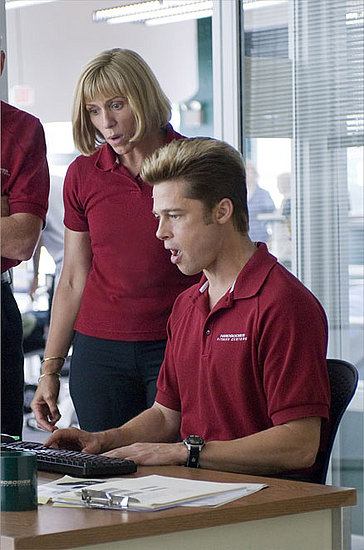
 Burn After Reading returns the Coen Brothers to their earlier, whimsical comedy stylings making fun of weirdo's, outsiders, and bumblers - movies like Raising Arizona, The Hudsucker Proxy, and The Big Lebowski - where characters with more ambitions than brains hatch cooky plans that get everyone fired, kidnapped, killed, or otherwise in some kind of trouble. The difference is that this time, the brothers Coen have set their bumblers in Washington D.C.: where comic bumbling has kind of become the credo of the past eight years of the Bush administration.
Burn After Reading returns the Coen Brothers to their earlier, whimsical comedy stylings making fun of weirdo's, outsiders, and bumblers - movies like Raising Arizona, The Hudsucker Proxy, and The Big Lebowski - where characters with more ambitions than brains hatch cooky plans that get everyone fired, kidnapped, killed, or otherwise in some kind of trouble. The difference is that this time, the brothers Coen have set their bumblers in Washington D.C.: where comic bumbling has kind of become the credo of the past eight years of the Bush administration.But lest you think this may be a trenchant sendup of Bush politics (a la Oliver Stone's "W"), bear in mind that the Coens have little interest in political points of view. Which in a way makes the Washington DC setting and the spy plot line oddly irrelevant to what the movie is really about - which is the idea of middle-age goofballs dealing with crushing disappointment and grasping for whatever small piece of salvation might happen to fall in their laps.
Burn After Reading introduces two sets of D.C. characters operating in different worlds of this highly transient city, whose paths disastrously intersect. The first are two Washington insider couples: washed-up CIA operative Osbourne Cox (John Malcovich) and his cold and distant wife (played by Tilda Swinton), who's having an affair with George Clooney's bumbling federal marshal, Harry Pfarrer, whose self-involved author wife is off in her own book-tour world. These four intersect with the dissatisfied managerial staff of a local gym (Hardbodies), played by the triangle of Fancis McDormand, Brad Pitt, and Richard Jenkins, when the gym managers find Osbourne Cox's diary - which they mistake for confidential CIA secrets - lying on the gym floor. Like Hi in Raising Arizona, Brad Pitt's character gets it in his head that this random find is really a cosmic gift that must be worth something to someone, and off we go.
By the end of the movie, everyone has run into everyone else in one way or another, and all the billiard balls end up falling into their appointed pockets.
Even so, there is unfortunately also a good deal of plotting laziness in this film. The two worlds never have an opportunity to comment on each other, and the fate of the characters seems more random than thematic, as if the brothers realized they had another movie to go make and had to quickly wrap up this one. That all makes the movie feel casually disjointed...closer to the random happenings of Oh Brother, Where Art Thou? than the tightly scripted No Country for Old Men or Fargo. Certainly there is no mistaking a Coen brother's movie, which always muses on the ambitions of overambitious losers and the random intersections of destiny, and usually delivers a healthy dose of mirth, as this one does. And yet, there can be such differences in quality and effect from film to film. Where No Country is deadly serious and important, Burn After Reading seems to go out of it's way to become a film of frivolity that wants to do nothing more than make you smirk for an hour and a half, then quickly forget.
All of which is to say, this is not a serious movie: the potential fun of Bush bashing in the D.C. setting is sadly wasted (with the exception of the promising opening scene), and by the time we get to the end, we may not care that much any more whatever it is the Coens have decided to do with all these bozos.
And yet: Malkovich is marvelous as the put-upon and cast-out spy. Swinton makes a wonderful bitch. McDormand stands out as the not-too-bright but desperately seeking Mr. Right gym manager, Pitt is satisfyingly goofy, and Clooney gives his usual over-the-top weird Cohen performance. And all the supporting actors, spies, and operatives give hilarious scenes spouting hokum, corporate-speak, and hooha in typical Cohen brothers fashion. So while this movie doesn't add up to much, it's certainly a lot of fun getting there.
Yes, Burn After Reading isn't in the top-tier of the Coen's ouevre, a Fargo or No Country. And it doesn't quite have the off-the-wall inspiration of a Big Lebowski. But it definitely qualifies in the Coen's second tier of comedies, the kind that are great fun going but add up to little, a kind of Arizona or Irreconcilable Differences. Now, considering that the Coen's second tier work is better than a lot of people's best stuff, maybe you want to see it.




No comments:
Post a Comment
Note: Only a member of this blog may post a comment.